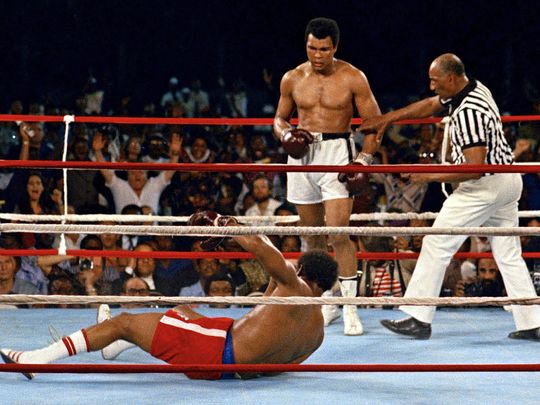Transformational Persuasion: Muhammad Ali, George Foreman, Donald Trump, Hillary Clinton, and Why It Matters – Especially When You’re Running an Arts Organization
Muhammad Ali died last week. A quote from a Zairian in “When We Were Kings.”
“George Foreman? We had heard he was a world champion.
We thought he was white, then we realized he was black, like Ali….
Ali said [about Foreman], you’re the out-of-towner here.”
Nonprofit leaders that manage organizations, programs, and people well can be quite successful. But not transformational. Transformational leaders effortlessly persuade with passion about the mission, not the statistics. Their material requires no script, just practice to remove the “ums” and “uhs.”
Trump, for example, vigorously (and effortlessly) transforms experienced opponents into “out-of-towners.” Clinton relies on effective policy, experience, and “being right.”
Passion KOs policy every time. Ask George Foreman.
Doesn’t your arts organization’s constituency deserve the most transformative experience you can offer? Or do you settle for production excellence and competence?
Special 2016 “Alan Harrison’s Birthday” Edition: Pack Up the Babies and Grab the Old Ladies – And an Easy-To-Fulfill Wish List

I was born on May 14. Conceived on a hot August night. Neil Diamond would’ve been proud. He was old enough to have a kid then, so…who knows? Brother Love? Are you my papa?
From him, I want flowers.
From you, I want (this is your cue):
- A 137-word card. ( <–Yes, that’s a link.)
- Share your favorite 137 Words post with your social network (that’s “share,” not “like”).
- To join a great company with a great mission. In Seattle.
- Health for The Kid.
- Guidance for The Kid.
- The love of my life to be happy, fulfilled, and curious. You know who you are.
- The ability for you to guide your favorite nonprofit to safety, security, and success.
- Brilliantly measurable missions, better than you believe you’re capable of.
- Complete, successful execution of those brilliant new missions.
- Pie, not cake.
Nonprofit Arts Executives: After the Ask (for anything, actually), It’s Fast “Yes,” Slow “No”… Try a Slow “Yes” Instead
If you don’t hear right away, it’s probably “no.”
That goes for asks, offers, hiring, and anything else you require.
And that goes for you, too, when your stakeholders ask, offer, hire, and anything else they may require.
Reflection is the predictable path toward rationalization to the “no.” This is why the phrase “upon reflection” is almost always followed by a version of “we’ve decided not to change.” After all, as a rule, it’s easier not to change than to take a risk.
Many arts charity executives preach the glory of “managed risk” (an oxymoron, of sorts) and value fiscal responsibility above social impact. To be clear, social impact is central to the success of the mission; fiscal responsibility is a valuable business practice.
If “yes” leads to greater impact, then stop saying “no”… especially upon reflection.
Leadership Issues: Flop Sweat, Board Meetings, and When You Lose the Room

Inevitably, there are moments where analysis disconnects with sentiment. You plan by yourself and generate work for your staff. Your staff objects. You have misread the room and caused great resentment. They think you’re a nut.
You’re in a big job interview. The interviewers say they want to “have a conversation,” but instead read from a pre-chosen list of questions. You try to converse. They bridle, citing “fairness.”
Your meetings with the board leave you rolling your eyes…and leave them rolling their eyes as well. You think they don’t understand the problem. They’re sure you don’t.
When you lead by pronouncement rather than by consensus; when you define interviews as interrogations; when you perceive meetings with superiors as continual performance evaluations – these are your issues, not theirs. That anxious sweat on your neck is on you.
Life on the Unraveling Nonprofit Arts Fringe: Why Hiring Experience and Guile Trumps Everything Else
Actor Hugh O’Brian is said to have coined “The 5 Stages of an Actor’s Career;”
- Who is Hugh O’Brian?
- Get me Hugh O’Brian.
- Get me a Hugh O’Brian type.
- Get me a young Hugh O’Brian.
- Who is Hugh O’Brian?
We’re in contact with hundreds of highly-experienced, resilient people who have made a career in the arts – and they’re having difficulties getting back into the field.
Some of it is ageism. Boards use headhunters to find smart young guns to lead departments or organizations — only to find that instead, they’ve hired brilliant 2-year placeholders with few people skills, entitlement issues, little flexibility, and quick parachutes.
Studies show those >50 stay longer than those under <40, are more productive, have better improvisational skills and flexibility, and are likelier to bring success.
Forget headhunters. Do your own search. Hire someone better than you.
Confusing the Messenger with the Message: Artistic Direction Fulfills the Arts Organization (Not Vice-Versa)
Being a great director has little to do with being a great artistic director.
Directors direct projects. Artistic directors use a collection of projects to fulfill a mission that serves a community. These are completely separate skills.
ADs who direct some projects for their own company risk treating those projects as precious. Too often, they break rules for their project (organizational mission, budget, marketing, etc.) that they would never allow an “outside” director to break.
And in too many cases, when the identity of a nonprofit arts organization is too closely entangled with the vision of an artistic director, the organization’s brand is that much more difficult to recuperate when inevitable leadership change occurs.
After all, succession is not merely an artistic director handpicking a successor, is it? A company is greater than any individual leader, right?
The Psychology of Being Last and 4 Other Ways to Level the Board Meeting Room Table
 Board meetings are often reporting festivals. Endless polite reports reminiscent of “what I did last summer” essays from the first day of elementary school. It’s too bad.
Board meetings are often reporting festivals. Endless polite reports reminiscent of “what I did last summer” essays from the first day of elementary school. It’s too bad.
Calculate the hourly consulting rate of the people in the room (for example, 15 board members x $100/hour = $1,500/hour). At $1,500/hour, do you want to talk about the past or the future?
Board members, inside the meeting room…
- Never do what the last person in the conversation advocates. It’s a trick manipulative people do.
- Consensus is not unanimity; votes needn’t be unanimous. After the decision is made, however, everyone needs to back it.
- No devil’s advocates; take responsibility for your disagreement.
- Read the ED’s report beforehand. EDs: issue your report at least a week before the meeting.
- Your ED is not responsible for writing and executing your strategic plan. You are.
If I ignore you, then you don’t exist! Hey! Why are you still there, existing???

Recent impressions from an interview for a development director position at a well-known theatre.
Managing director picks me up at airport. Interviews me in car. First impression… he drives, in more ways than one.
Dinner for eight. Laughs, rowdiness, and Malbec. Second impression…an uninhibited group.
The play. Well-performed one-man show. Third impression…no money.
The interview marathon. 6½ hours, no breaks. Fourth impression: disorganized thinkers.
Complete silence. For over two months, despite leaving message for managing director on his cell. Fifth impression: brutal place to work.
Sent email taking myself out of the search. Direct quote from board president: “I don’t know the protocol in the nonprofit world. In the engineering world, where [we] are both from, you don’t hear anything unless you are hired.” Final impression: they’re horrible at human relations…must be why they have no money.


